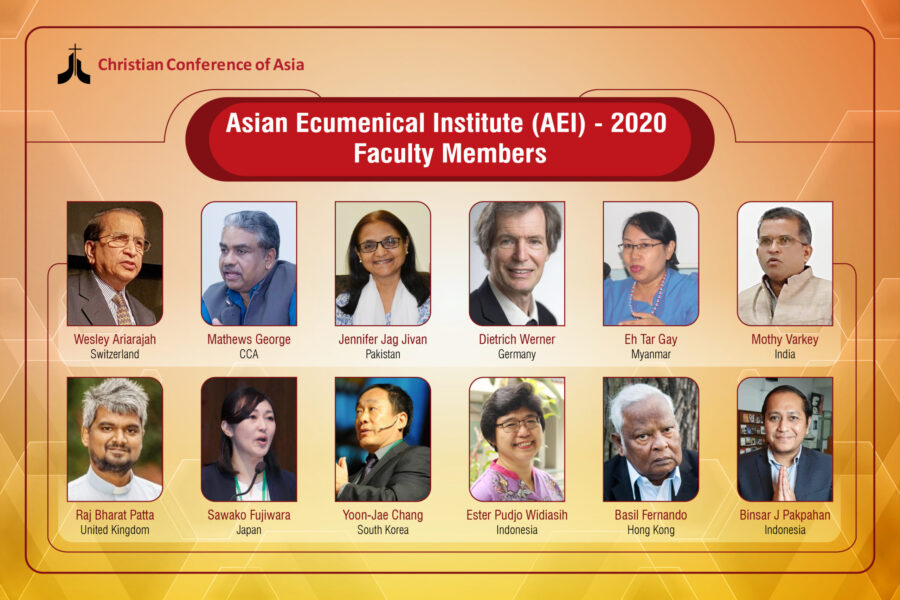Asian Ecumenical Institute (AEI)–2020 set to begin

CHIANG MAI: Organised by the Christian Conference of Asia (CCA), the annual Asian Ecumenical Institute (AEI), a month-long ecumenical formation and leadership development training course, is set to commence next week on 2 November 2020.
Under the current circumstances caused by the ongoing COVID-19 pandemic, the AEI–2020 will be held online. The theme of AEI–2020 is ‘We are Called to be Stewards for Renewal and Restoration of God’s Creation’.
Thirty-eight students, selected from over eighty candidates who had applied from across Asia, will attend the AEI–2020.
Highlighting the importance of AEI–2020, Dr Mathews George Chunakara, the General Secretary of the CCA, stated, “AEI serves as an impactful means of honing the talents and potential of the prospective leaders of the church and the ecumenical movement in Asia.”
“The experiences of the participants of earlier AEIs shared with us testify that the training they had undergone in the past was transformative. Though we are not able to meet in person this year, we are positive that the virtual training experience will offer the opportunity for learning from our highly experienced and internationally recognised faculty of this year’s AEI,” added the CCA General Secretary, who heads the CCA Staff Coordinating Team for AEI.
Ani Christy Manvelian, selected from the Islamic Republic of Iran, said that she considered AEI to be a unique regional platform for training the new generation of ecumenists in Asia.
Julmia Lamhot da Silva, a student selected from Timor Leste, said that she was keen on gaining new experiences and looked forward to sharing her learnings with the youth in her church.
Rev. Widanelage Hashan Andre de Mel from Sri Lanka said he hoped to imbibe a renewed vision for ministry in the spirit of ecumenism and was excited about the topics and syllabus of the course.
The AEI–2020 faculty comprises internationally reputed ecumenists, theologians, academicians, and social scientists, as well as human rights defenders, in addition to the in-house faculty consisting of CCA programme executives.
Prominent members of faculty include Prof. Dr Wesley Ariarajah, Emeritus Professor, Drew University, USA, who was the Deputy General Secretary and Director of Interreligious Dialogue Division of the World Council of Churches in Switzerland; Prof. Dr Dietrich Werner, Senior Theological Advisor for Ecumenical Education and Research of the Bread for the World in Germany and former Director of Theological Education of the World Council of Churches in Switzerland; Dr Eh Tar Gay, Professor and Vice President of Myanmar Institute of Theology; Dr Mothy Varkey, Professor at Mar Thoma Theological Seminary in India; Dr Sawako Fujiwara, Professor at Lutheran Theological Seminary in Tokyo, Japan; Dr Raj Bharat Patta, Methodist Church in the UK; Dr Ester Pudjo Widiasih, Professor of Liturgy at Jakarta Theological Seminary in Indonesia and former Programme Executive for Spiritual Life at World Council of Churches in Switzerland; Dr Yoon-Jae Chang, Professor of Systematic Theology at Ewha University, South Korea; Basil Fernando, renowned Asian human rights defender and former UN official from the Asian Human Rights Commission, Hong Kong; Dr Binsar J. Pakpahan, Dean of Ethics and Public Theology at Jakarta Theological Seminary, Indonesia; Dr Reynaldo Racaza Ty, former Professor of Political Science in Philippines universities; Jennifer Jag Jivan, Director of Christian Study Centre in Pakistan; and Dr Mathews George Chunakara, General Secretary of the CCA and former Director of International Affairs at the World Council of Churches in Switzerland.
The AEI–2020 sessions will conclude with the valedictory session on 30 November 2020.










